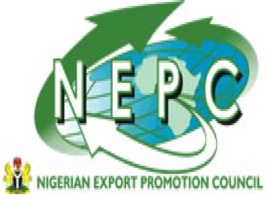
 As Nigeria moves towards diversifying the economy, the Nigerian Export Promotion Council (NEPC) has set a long-term target of achieving $100billion earnings from non-oil exports.
As Nigeria moves towards diversifying the economy, the Nigerian Export Promotion Council (NEPC) has set a long-term target of achieving $100billion earnings from non-oil exports.
The executive director\CEO, Nigerian Export Promotion Council (NEPC), Mr Olusegun Awolowo, disclosed this while presenting a paper, “The ‘Zero Oil Plan and Export Revolution” during a Development Agenda for Western (DAWN) Commission/NEPC dialogue on economic diversification with some representatives of six south west states, at the headquarters of DAWN Commission in Ibadan.
He said the move was meant to salvage the country from its over reliance on oil and to fill the current financial hole created by the fall in oil price, adding that the Council was on a mission to diversify the country’s resource base.
He recalled the words of President Muhammadu Buhari to a delegation of manufacturers last year: ‘Nigeria must begin to behave as if we have no oil,” and said government’s priority is to attain economic diversification. According to him, “Nigeria must think big to achieve big in the course of actually making huge revenue from exports.”
He said President Buhari’s comment had shaped Nigeria’s ‘zero oil’ economic agenda, which is essential to build a strong Nigerian economy for the future.
“For years, Nigeria has imported thousands of goods worth over $50 billion a year, which we pay for mainly with crude oil proceeds of over $70billion each year,” he noted.
“Our fears have now materialized; in the past two years, crude oil prices have fallen 60 percent and Nigeria’s earnings have likewise fallen by at least $35billion, inevitably leaving a financial hole in the economy. The pressing question now is how to fill this funding gap, and the answer is simple: Nigeria must quickly find an alternative to oil revenue.
“If Nigeria broadens and grows its export basket, a positive chain reaction ricochets throughout the economy. The logic follows: when you grow exports, national output (agriculture, industry, solid minerals) will also grow; local businesses will grow; supporting infrastructure will expand, and jobs and investments will definitely follow,” he said.
While explaining the overall macro impacts result in growing foreign reserves (from export forex) and a more resilient economy, he said: “At Nigerian Export Promotion Council (NEPC), first, we set a long term goal of earning over $100billion from non-oil exports, that is, 20 per cent of today’s GDP.
“When compared with export to GDP ratios of other emerging market countries, this is reasonable: China’s is 24 percent; Brazil, 12 percent; South Africa, 31 percent, and Malaysia, 76 percent,” he added.
Awolowo said that Nigeria’s long term goal was however further broken down into two mid-term targets; which is to grow non-oil exports from $5billion today to $18billion by 2019 and $30billion in non-oil exports by 2025.”
He added that growing non-oil exports six-fold in nine years will be a feat indeed, “but then, again, these are extraordinary times, and we need extraordinary economic action.”
In implementing this plan, NEPC boss said hundreds of thousands of jobs would be created every year from numerous activities of non-oil economy.
“The zero oil plan identifies 21 priority countries as markets for Nigerian products, termed “Export 21”, and 11 strategic export products with high financial value to replace oil.
“These include petrochemicals, palm oil, cocoa, soybeans and rubber, to name few. To achieve this, Nigeria must scale up domestic production to levels unprecedented and create competitive channels to move cargo and get goods into foreign markets.
“The plan envisages increases in total non-oil export volumes in Nigeria which should grow by 70 million tonnes, clearly a logistical challenge that would require upgrades on major transport corridors to get goods from Nigeria’s hinterlands in every single state of the federation to ports in Lagos, Port Harcourt and Calabar.
“The plan facilitates export aggregators to source products from millions of micro, small and medium sized enterprises, which ensures our grassroots, youths and households also feel the economic impact of exports,” he said.
Awolowo, who exhibited confidence in the success in the diversification of Nigeria’s oil driven economy to non-oil export, said the Council was prepared for the task of achieving this lofty mission.
“We are not starry-eyed optimists, as moving a Nigeria with zero oil will not be easy. But we should remember that we once had a country that was zero oil. The questions to ask are: what happened to our proud history in palm oil, cocoa, ground nuts, cotton? We were the toast of the world, where are these products now? We know in good days Nigeria typically makes over $70billion annually from crude oil exports, but the world is bigger than oil.
“Only three of the top 20 exporters in the world depend heavily on oil exports, and today even those three are fast diversifying. Indonesia makes over $18billion from only palm oil exports (we understand the Indonesians took their first plant seed from Nigeria over 50 years ago); Brazil makes $17billion from soybeans; Saudi Arabia makes over $30 billion from petrochemicals and Bangladesh makes $5billion from T-shirts,” he said.
The NEPC chief executive further enjoined each state in the federation to select one priority export product under one of its campaign, ‘One-state-one product programme,’ adding that if each state, including the Federal Capital Territory (FCT), can key in to the scheme, Nigeria already has at least 37 non-oil exportable products.
On his part, the director-general, DAWN Commission, Dipo Famakinwa, assured that the commission was ready to support and partner the Council, noting that “NEPC is strategic to the diversification of Nigeria’s economy.”
